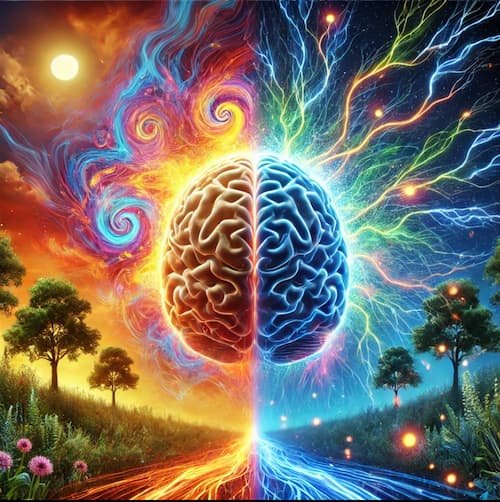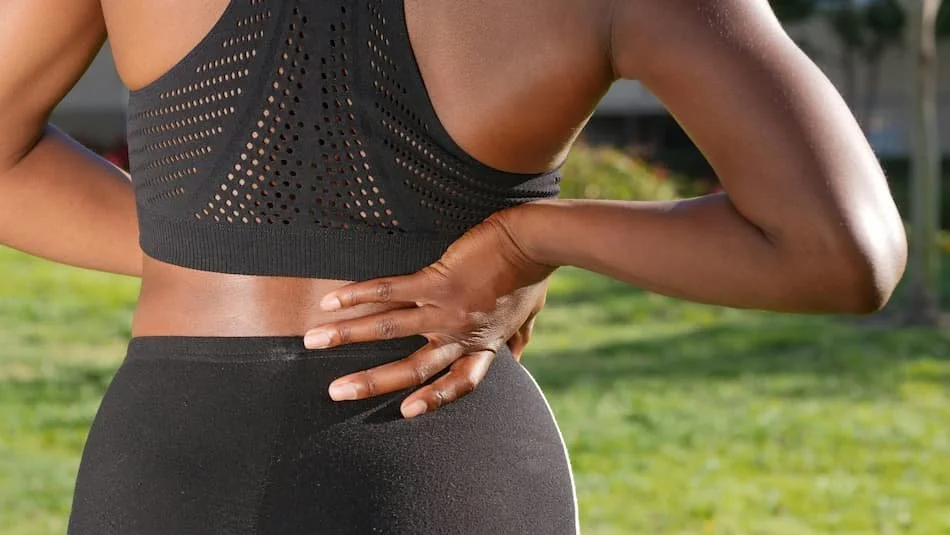Massage Therapy & ADHD: How Bodywork Supports Focus, Relaxation, and Nervous System Balance
💜 At Wild Roots Massage Therapy, I welcome all bodies, all backgrounds, and all identities. This is a space where you are supported and valued, without judgment.
Massage therapy can calm the ADHD nervous system, supporting focus, balance, and relaxation.
My ADHD Journey: Why These Strategies Matter to Me
I didn’t learn I had ADHD until I was in my 40s.
For most of my life, I just thought I needed to “try harder” to stay focused, finish projects, or stick to long-term goals. In school, I struggled to pay attention in class and had a hard time studying, even when I was genuinely interested. Later, I found myself overwhelmed by mental to-do lists, jumping between tasks, and unable to fully relax, even when exhausted.
When I was finally diagnosed, everything clicked. It wasn’t a lack of effort; it was how my brain was wired. My nervous system was constantly running in overdrive, and I hadn’t realized how much it was affecting my body.
Becoming a massage therapist was a turning point. Each session required me to ground myself, tune into another person’s body, and stay present. In a world where my mind was always racing, massage became my anchor, a structured, calming way to focus my energy.
That’s why I’m passionate about helping people with ADHD manage stress, release tension, and feel more grounded in their bodies. These strategies aren’t just things I recommend; they’re tools I use myself.
✔ Massage therapy resets my nervous system.
✔ Exercise burns off restless energy and sharpens focus.
✔ Journaling or “mind-dumping” before bed quiets racing thoughts.
✔ Grounding techniques help me embrace stillness without agitation.
1️⃣ The ADHD Brain & Nervous System Overload
ADHD is more than focus struggles; it’s closely tied to nervous system regulation.
The ADHD brain has lower dopamine levels and difficulty switching between fight-or-flight (stress mode) and rest-and-digest (calm mode). This is why so many people with ADHD experience:
Chronic muscle tightness (especially in the neck, shoulders, and jaw).
Restlessness or difficulty sitting still.
Shallow breathing or breath-holding during tasks.
Trouble fully relaxing, even when tired.
Research shows that massage therapy and ADHD are closely connected. Massage can help calm the nervous system, ease stress, and improve focus, making it a supportive option alongside other care strategies.
2️⃣ Why People with ADHD Hold More Physical Tension
ADHD isn’t just mental; it shows up in the body.
Fidgeting and hyperactivity create chronic neck, shoulder, and back tension.
Jaw clenching and teeth grinding are common outlets for nervous energy.
A heightened fight-or-flight response keeps muscles activated, even at rest.
Grounding Through Touch
Deep pressure and grounding sensations, like massage therapy, help people with ADHD release stored tension and calm the nervous system.
ADHD & Sensory Processing Challenges
Many people with ADHD also experience sensory differences:
Some seek deep pressure (firm touch, weighted blankets, or grounding massage).
Others are sensitive to light touch, unpredictable sensations, or strong scents.
This is why a customized massage experience matters. Some clients need firm, grounding pressure to feel safe; others respond better to slow, gentle techniques.
3️⃣ Communicating Preferences for a Personalized Experience
If you have ADHD, or strong sensory preferences, communication is key.
Scents: Request scent-free or ask for specific aromatherapy.
Table Warmth: The heater can be adjusted.
Pressure: Ask for more or less pressure anytime.
Techniques: Share which styles feel best.
Music: Request silence, calming music, or bring your own playlist.
At Wild Roots in Calgary NW, your massage is built around your needs. The more personalized it feels, the more effective it becomes.
4️⃣ How Massage Therapy Helps with ADHD Symptoms
Massage helps people with ADHD experience stillness, grounding, and nervous system balance.
Massage goes beyond relaxation. It directly supports dopamine balance, nervous system health, and sensory regulation.
✔ Boosts Dopamine & Serotonin
Research shows that massage therapy for ADHD may help by boosting dopamine and serotonin by up to 30%, improving mood and focus (Field et al., 2005).
✔ Regulates the Nervous System & Lowers Cortisol
Massage activates the parasympathetic system, lowering stress hormones and helping ADHD brains shift into calm.
✔ Encourages Stillness Without Restlessness
Deep, rhythmic touch provides sensory input that grounds the body and mind, making stillness feel safe.
5️⃣ ADHD-Friendly Self-Care Techniques to Try
Silent Massage: No small talk, just stillness.
Movement: Spin, walking, or strength training to burn energy.
Mind-Dump Journaling: Write thoughts before bed to reduce racing mind.
Massage Add-Ons: Try Therapeutic Massage with hot stones or cupping for deeper relief.
6️⃣ Making Massage Part of Your ADHD Self-Care Plan
ADHD brains thrive with structure. Massage can become a sustainable routine with a few strategies:
Book Recurring Appointments: Set them in advance so you don’t rely on memory.
Link It to a Habit: Example: “I book a massage every second Wednesday after work.”
Use Reminders & Packages: Automated reminders or prepaid sessions reduce decision fatigue.
Keep It Low-Stress: Simple booking and payment systems make follow-through easier.
Support Focus at Work: Long hours sitting at a desk can make ADHD symptoms and body tension worse. Regular massage helps ease posture strain and nervous system overload. Learn more in my Massage Therapy for Desk Workers blog.
Final Thoughts: Calm, Focus, and Nervous System Support
Living with ADHD often means carrying extra tension in the body and feeling mentally overstimulated or restless. Massage therapy in Calgary can help calm the nervous system, ease muscle tightness, and create the conditions for better focus and relaxation. With consistent care, massage becomes a powerful tool for balance, helping you recharge both body and mind.
At Wild Roots Massage Therapy in Calgary NW, I offer therapeutic massage, TMJ care, and nervous system–supportive treatments tailored to each client. Conveniently located near Capitol Hill and Crescent Heights, I’ll work with you to release tension, regulate stress patterns, and support your overall well-being.
Ready to experience how massage can support your ADHD journey?
Frequently Asked Questions About Massage Therapy & ADHD
Can massage therapy help with ADHD symptoms?
Yes. While massage does not treat ADHD directly, it supports nervous system regulation, which many people with ADHD struggle with. By reducing muscle tension, calming the stress response, and improving body awareness, massage can make it easier to focus, relax, and feel grounded.
How does massage affect the ADHD brain and nervous system?
People with ADHD often shift quickly between fight-or-flight (stress mode) and rest-and-digest (calm mode). Massage therapy helps activate the parasympathetic nervous system, encouraging the body to leave stress mode and move into a calmer, more regulated state. This can reduce restlessness, shallow breathing, and jaw or shoulder tension.
What type of massage is best for ADHD?
Therapeutic massage with a slow, focused approach works best. Techniques that calm the nervous system, such as gentle deep tissue, fascia release, cupping, or hot stone integration, can support relaxation while also addressing chronic muscle tightness common in ADHD clients.
Does massage help with focus and concentration for ADHD?
Many clients report improved clarity and focus after a massage session. By decreasing physical tension and lowering cortisol, massage allows the brain to shift into a state where focus and attention come more easily. Regular sessions can help reinforce this nervous system balance.
Where can I book ADHD-focused massage therapy in Calgary NW?
Wild Roots Massage Therapy in Capitol Hill (Calgary NW) offers massage treatments tailored for nervous system support, ADHD, stress relief, and chronic muscle tension. You can book an appointment here.
Do I need to talk during the massage?
Not at all. Many people with ADHD find talking can keep their mind active, so silence helps the nervous system settle. You’re welcome to chat if it feels good, or rest quietly, whichever helps you relax.
Can massage replace ADHD medication?
No, massage therapy is not a replacement for ADHD medication or professional treatment. It’s a supportive therapy that works alongside other strategies, helping reduce stress and muscle tension so daily life feels easier.
Is massage therapy safe if I have ADHD?
Yes. Massage is safe and adaptable. Your therapist will customize the session to your comfort level, whether you need a calm, grounding approach or focused work on tension in the neck, shoulders, and jaw.







